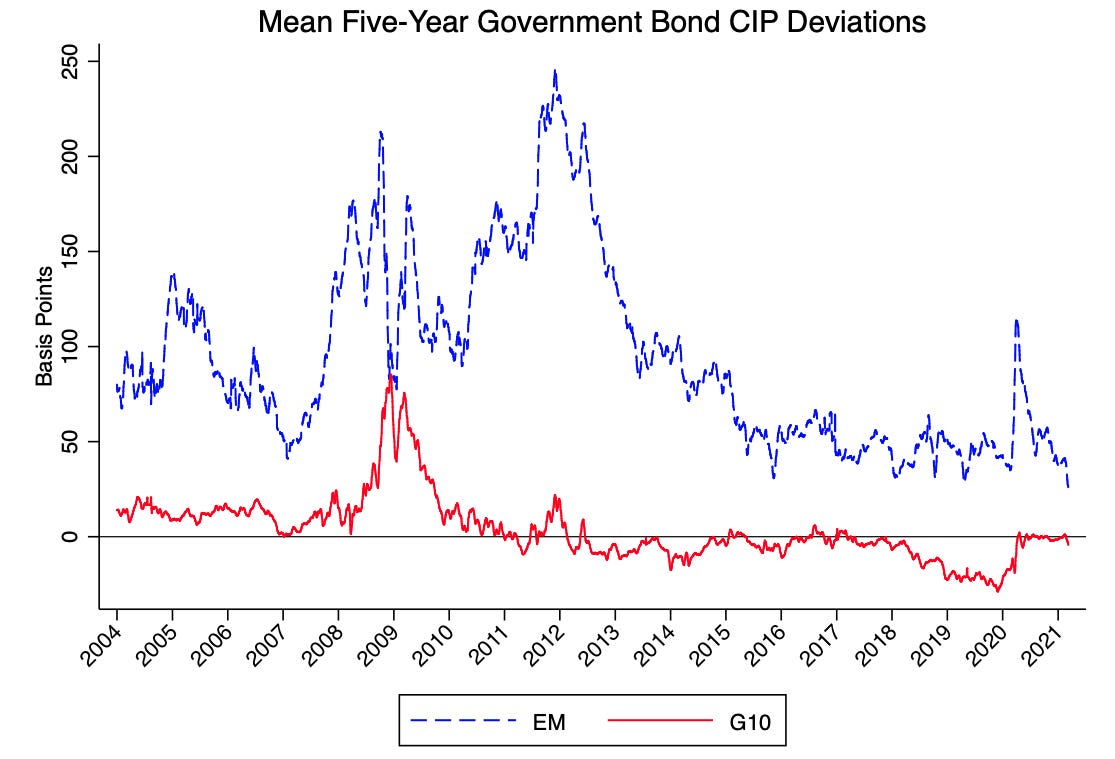Known Unknowns
It's expensive to not lose your money, but it may get cheaper...
Hello,
Welcome to Known Unknowns, a newsletter about what to do with all the wealth we don’t have.
Safe asset shortage, we hardly knew thee
It seems like for the last 15 years or so we kept hearing about the “safe asset shortage” – it was the source of the savings glut. The story went that the world was desperate for “risk-free” assets – or assets that are liquid and provide a certain rate of return. They were desired by foreign governments looking to manage their currencies and capital flows, banks for regulatory purposes, and, well, anyone looking for low-risk assets.
The safe asset shortage brought down interest rates, made investors open to assets that weren’t so safe – but you could squint and pretend they were (think Greek debt or mortgage-backed securities). It also is why the US government could spend like crazy, and the bond market did nothing but shrug. All of this caused all sorts of problems.
It seems like you don’t hear much anymore about the shortage. Foreigners are not buying US debt like they used to, and that’s a pretty big deal we don’t spend much time thinking about. Stanford finance professor Hanno Lustig sent me this nice picture from Wenxin Du that shows covered interest parity deviations for US Treasuries. It suggests that the premium foreign investors are willing to pay for US Treasuries is falling (especially for long-term debt) and may even be negative now.
The safe asset shortage may be over. So why are still rates so low? The Fed is still buying lots of debt and it provides a big safe asset in the form of reserves it pays interest on. But this raises the risk of a safe-asset glut, if, say, the Fed starts selling instead of buying bonds – if, say, it decides to do something about inflation. Speaking of gluts, the Fed is planning on taking more repos, hoping this will help the bond market work better in the future if things do get gnarly, though it may just be stealth tightening.
But we should be concerned (not panicked, but concerned) because a glut could mean rates go up – and not in a gradual nice way. Both a glut and a shortage cause trouble. Markets are happier when they are in equilibrium. And, with the amount of debt we are carrying, I think I’d take a shortage over a glut.
Universal Basic Wealth
The strange new policy idea coming from Silicon Valley is universal basic wealth. It’s like universal basic income, expect you get a pile of money once, twice, or several times to build your bank balance. Eric Schmidt and Evan Spiegel think the state of California should take its budget surplus and give everyone a cash payment, which is automatically invested in – you won’t believe this one – start-ups in Silicon Valley that they also invest in.
Now, even if you put aside the absurdity of Silicon Valley billionaires looking to enrich themselves with taxpayer money by funneling it through low earners, and having the audacity to write an op-ed about it, the idea may have legs. Take Cory Booker’s baby bonds, which also aim to build wealth by giving every child money and then offering high guaranteed rates of return.
Now, there are so many problems with all these plans, in addition to the cost and many, many details that need to be worked out. Like how it is invested and who pays for these guarantees? The big question is: Is UBW supposed to be wealth? Or to ensure everyone has a certain bank balance? If so, all we did is take money from the future, give it to people now, and keep them from spending it and thereby create a large constraint on their savings and consumption behavior. That seems suboptimal to me, so many models of life-cycle savings and public finance are exploding in my head.
Or, maybe we let people spend the money. But, then it is not wealth, it is a cash payment, which is more like an income, and we have all the same issues with UBI. I agree there is a problem. Having parents help you out with school, a home, or starting a business gives you a huge advantage in life – and that’s not fair. But we do have better targeted programs (or could come up with them) to help people who are trying to make their way without a big bank account-like Pell grants. We should do those instead.
Planet Money University
Speaking of investing your wealth in risky or safe things. This summer, I recorded three episodes of Planet Money University with Cardiff Garcia and Mihir Desai (whose book I love). This summer, it is on the basics of investing, and I think it came out great (I take no credit for that; I just answered a bunch of questions). I am a big believer in financial literacy, but it needs to be done right. And, after so many people started investing this year, I think the timing is great. The first episode is up now, so check it out. We even do an episode on life-cycle investing, which is rarely discussed outside of academia, but it really why we invest in the first place.
In other news
My thoughts on mask mandates, be a Bayesian.
I was also on the Indicator; more hate mail followed.
Until next time, Pension Geeks!
Allison

